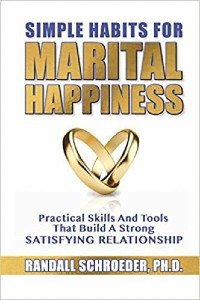Dr. Randy Schroeder: Praise creates positive energy in a marriage. And it’s interesting to me, every counseling session, I’ve done thousands and thousands of counseling sessions with couples. Every session I begin with a couple, I have them appreciate each other.
John Fuller: Dr. Randy Schroeder joins us again today on Focus on the Family. And we thank you for joining us. I’m John Fuller. And your host is Focus president and author, Jim Daly.
Jim Daly: John, I think we both agree the conversation last time was so helpful. There’s so many great little deposits of wisdom-
John: Mm-hmm.
Jim: … that Randy provides in this book, Simple Habits for Marital Happiness. I mean, you could just start taking little notes.
John: Yeah. He’s got a way to make things stand out and be remembered. There’s some great hooks.
Jim: It’s perfect. We discussed simple choices that really strengthen your connection with your spouse. Who doesn’t want that? Things like saying thank you and reconnecting for two minutes at the end of the day, saying, “I love you,” when you leave the house, saying, “I love you when you go to bed at night.” They … You think of those as just, you know, fluff. But couples that practice those habits have happier marriages. And it doesn’t take a lot, but it’s thoughtfulness that counts.
John: Mm-hmm.
Jim: And I’m looking forward to another part of that discussion today.
John: Yeah. And if you missed anything, uh, from the previous conversation, we’re available on YouTube. You can, uh, find us wherever podcasts are at. Stop by our website. Our number is 800-A-FAMILY, 800-232-6459. And, uh, you’ll find us at focusonthefamily.com/broadcast. And Dr. Randy Schroeder is a former seminary professor. He’s a pastor and a marriage and family counselor. He’s written a number of books, and, uh, we’re gonna come back to one that’s, uh, as Jim said, very, very accessible and very practical. It’s called Simple Habits for Marital Happiness. Uh, the subtitle is Practical Skills and Tools That Build a Strong Satisfying Relationship.
Jim: Randy, welcome back to Focus.
Dr. Schroeder: Well, it’s a privilege to be with you. And I look, uh, forward to talking more about habits that lead to successful, happy marriage.
Jim: You know, you strike me as that guy that, um… And it’s meant as a compliment. You, you set your life path very predictably. You repeat the habits. You assess the habits, and I can just tell you’re, you’re a pattern person.
Dr. Schroeder: Well, I am. And, and it’s, uh… Healthy people, I believe, are pattern. You know, they-
Jim: Well, thanks a lot.
Dr. Schroeder: (laughs)
Jim: That just put me outside because (laughs) the next thing I was gonna say, “I don’t tend to be that way.” So how can you help me?
Dr. Schroeder: You’re very structured. (laughing)
John: Yeah.
Jim: Uh, that’s funny. You should go there. But, yeah, I, I always am a bit envious, not in a negative way, but people that can see the right thing to do and then repeat that over and over again. I think my extrovert nature tends to get bored with that. And I gotta think of a new way to do it. But you’re saying patterns in marriage are really important. That’s what I’m hearing.
Dr. Schroeder: Well, and I, and I mentioned yesterday, 80% of our behaviors are habits. So in a sense, everybody has patterns.
Jim: Randy, I’m sunk, man. (laughing) But this is good. This is good. This is for me. (laughs)
Dr. Schroeder: S- so, yeah. So healthy habits make a difference. You’re correct.
Jim: Okay. Let’s start… Uh, we’ll pick up last time and, hopefully, folks, there was so much great practical information in the broadcast yesterday. Pick it up, like John said, smartphone app’s a great way to get it. But let’s pick up from last time. Um, listening, uh, can be a man’s worst enemy. Uh, we’re kind of thinking of things and we’re not fully… I mean, the other night I did this. Jean asked me. We’re at a fast food restaurant. She said, “Can you get me a cup of ice?” And I went, got the cup, filled it with ice, and filled it with water. And then I brought it back, and she said, “No, no, no. I just wanted a cup of ice.” Oh, oh. I go back. I throw the ice water away and bring her the cup back. I’m serious. (laughing) I… We were on a long drive.
John: It must have been after, like, four or five o’clock in the afternoon.
Jim: We were on a nine… We were on a nine-hour drive.
John: Oh, my.
Dr. Schroeder: Yeah.
Jim: So maybe my mind was just spongy.
Dr. Schroeder: Yeah.
Jim: And she said, “Oh my, I just want a cup of ice.” (laughing) Well, thank you. Let me go get that. I think I got it now-
Dr. Schroeder: Yeah.
Jim: … since the other two ways didn’t work for us here, but I mean, it was like a listening block. I… Literally, I’ve never done something like that before, but I was not computing what she was saying. (laughing)
Dr. Schroeder: It, it happens to all of us. And, uh, yeah. But we need to strive to be world-class listeners. And I think a good way to do that is to ask two questions of our spouse. You know, kind…. The first question is kind of a warm-up question. You know, it could be “How was your day today?” And the follow-up question really makes our spouse feel special and valued. Okay. And so, uh, the two consecutive question guideline helps a lot of relationships and helps us listen well because, a lot of times, individuals, we see this even in life where I ask a question to you and say… you say, “How was your day?” And you say, “Well, it didn’t go real well.” And rather than say what didn’t go well, they start talking about their day. And so two consecutive questions really forces spouses to express interest in their partner. And that makes a difference in the relationship.
Jim: No, I like that. Uh, you counsel a woman who corrected her husband all the time. I think this is very instructive too, because I think everybody could see a little bit of that in your relationship, I would think. I mean, that happens with Jean and I. Um, the question is, “How often does that happen, (laughs) and to what degree?” So this is a great illustration of unhealthy correction.
Dr. Schroeder: Yeah. And there’s a difference, I would say, between constructively correcting or criticizing and expressing wants and needs or expressing expectations. But a major predictor for unhappiness, separation, and divorce is criticism where one spouse is just critical and complaining all the time, and, and they’re never satisfied. And often, they’re perfectionistic. They’re… They can be critical of themselves, critical of their spouses, critical of their kids. And in fact, this couple that I mentioned in my book, uh, she criticized her husband all the time for everything. She criticized him on how he at- ate ice cream, if you can believe it. She-
Jim: I’d get out of the way. I wouldn’t criticize (laughing) anybody on how they eat ice cream. Man, that’s dangerous territory.
Dr. Schroeder: Yeah. Yeah, it is.
Jim: (laughs).
Dr. Schroeder: I mean, it’s good. You just want to get it, get it down to your tummy. And so… And, and she criticized him how he put the trash liner in the trash can. And so-
Jim: That may make a little more sense.
Dr. Schroeder: I, I… Yeah. so I suggested, uh, to the couple. I said, “Let’s try and experiment.” I said, uh, because he was just beaten down, you know. And, and criticism will do that. And so I suggested for one week they both avoid criticism, constructive corrections, complaining. And immediately, the husband said, “That’s a great idea.”
Jim: (laughs).
Dr. Schroeder: And he, he said, he said, “No, I wanna go two weeks.” And he said, “No, I wanna go three weeks.” And he said, “No, I wanna go a whole month.”
Jim: Yeah.
Dr. Schroeder: And the wife said, “That’s a dumb idea.”
Jim: Oh.
Dr. Schroeder: I need to continue to correct him when he does things that I think are not right. And she would not do it. Now, she also had adult kids that struggled. I mean, they’ve been married over 25 years. And, and she was constantly criticizing pretty much everyone in her family.
Jim: Randy, let me ask this question too. Um, so often, with the Christian context, you know, two committed people, we will evaluate the fact that we don’t disagree much, or we don’t ever argue as a spiritual virtue. And I would think in a counseling environment, as a counselor, that’s admirable. But then you start asking yourself, “How deep is this going?” ‘Cause if they can live at that level, they’re obviously not occasionally bumping into each other emotionally, which means they may not be interacting as deeply as they should. So speak to that and maybe even give an illustration where the couple is saying, “You know what? As Chris…” And we, we get that kind of response here when we have a guest on who says, you know, our marriage was rocky. Well, if you’re a Christian and you’re in your marriage, you shouldn’t have rocky. And we’ve never argued. I mean, I can remember getting some of that correspondence here at Focus, and I thought, “Wow, that marriage might be in as much trouble as the other one. They just don’t know it.”
Dr. Schroeder: Exactly. You said it, uh, excellently. And they’re not emotionally close. You know, we’re gonna have hurts and disappointments. You know, it, it…. Maybe, we’re not getting enough hugs from our spouses, or maybe, uh, we want, uh, more conversation. They’re not giving us enough conversation. Uh, for, again, 25 years, I was a seminary professor. I remember a seminarian in my class. We were gonna talk about, uh, you know, how do you handle those hurts and disappointments? And he raised his hand, you know, again, married 25 years. And he said, “Dr. Schroeder,” he said, “My wife and I have never had a disagreement.” And, you know, I wasn’t gonna embarrass him in front of the whole class. I just said, “Well, that’s nice. Thanks for sharing.” (laughing).
Jim: See you after class.
Dr. Schroeder: But I, I felt sad because he does not have a close relationship. Uh, we, we can respect each other’s differing opinions, differing viewpoints. We can respect each other when they, when they… our spouses share a hurt with us. But that keeps us close to do that talking together about what we can do to make it better.
Jim: And I, I think it’s, it’s kind of when you have the…. a, a healthy intensity in the relationship, it’s actually good. It’s what God intends.
Dr. Schroeder: Yes.
Jim: I mean, we are two imperfect people, but you should be colliding here and there-
Dr. Schroeder: Well-
Jim: … and working that out healthy in a healthy context.
Dr. Schroeder: And, and I would say the colliding put in quotes i- is, “respectful-”
Jim: Yes.
Dr. Schroeder: … you know. Yeah. You wanna, you wanna be respectful. Disagree, yes. Disrespect, no.
Jim: Let me also ask you, um, some will be familiar with this rule, but remind us, uh, the I messages. You’ve mentioned that a few times. I observed… I… What are the I messages versus the you messages?
Dr. Schroeder: Well, and that, that’s kind of it, that speak the truth in love.
Jim: Yeah.
Dr. Schroeder: You know, when, when I see you do this, or when I hear you say that, you know, I feel, uh, heard or disappointed, and we should never… We need to, uh, never begin with you unless we’re gonna praise our spouse.
John: Mm-hmm.
Dr. Schroeder: If we’re gonna say, “You’re a wonderful Christian wife,” or, “You’re a wonderful Christian husband,” uh, we wanna avoid you use attacking. That’s a three-letter word to forget the word, but. Forget that one. And why also is attacking. And so we-
Jim: Yeah.
Dr. Schroeder: … don’t wanna do that either.
John: Well, we’ve learned a, a lot along the way here. We still have more to come on this episode of Focus on the Family with Jim Daly. Our guest is Dr. Randy Schroeder. And, uh, we’re uncovering a lot from his book, Simple Habits for Marital Happiness: Practical Skills and Tools that Build a Strong Satisfying Relationship. Contact us today for your copy of that book and, uh, other helpful resources for your marriage. Our number is 800, the letter A and the word FAMILY, or stop by focusonthefamily.com/broadcast.
Jim: Randy, you mentioned in the book, when you disagree with your spouse, you recommend a soft startup. Now, being Irish, I don’t know anything.
Dr. Schroeder: (laughs).
Jim: What do you mean a soft startup? I wanna go right to the issue. Let’s go, let’s tackle it. What’s a soft startup?
Dr. Schroeder: That, that is absolutely essential. And again, I’ve done a lot of marriage research, uh, reading and, uh, harsh beginnings lead to harsh endings almost 100% of the time.
Jim: Okay. This is a proverb now. (laughs)
Dr. Schroeder: And it-
Jim: That’s what it sounds like.
Dr. Schroeder: Yeah. And harsh endings, uh, often lead to divorce.
Jim: Oh.
Dr. Schroeder: And so we need to have soft startups as you just asked about. And, uh, what’s… I should-
Jim: Yeah, what’s the example?
Dr. Schroeder: I should define a harsh beginning first. You know, “You always, you never, you’re stupid, you’re dumb. We need to talk. I’ve got an issue. We’ve got a problem.” You know, that’s a harsh beginning. And the other spouse im- immediately puts up a defense wall. And so a soft startup is, “I need your help.” As Christian people, the three of us wanna be helpful for others. That’s why you do what you do serving our Lord Jesus here at Focus on the Family. And so I need your help is disarming. And I can’t tell you how many couples have said that made a huge positive difference in our marriage relationship, to use those words, I need your help. Now, if it’s not a good time to discuss, the other spouse can say, “Hey, this is just not a good time.” Spouses need to be, uh, in a pleasant mood, a decent mood. So they’ll have the energy to look for solutions rather than attack and blame. And, and the other… I always call it the terrific three. Uh, couples need to have discussions after 9:00 in the morning, before 9:00 at night. They need to always sit down. They need, uh… So they’re not standing and yelling at each other. And they need to always begin with, “I need your help.” And those three simple yet effective habits, I would say those alone, besides all the other habits in the book, have saved probably 500 marriages from divorce.
Jim: Mm-hmm.
Dr. Schroeder: I’ve had-
Jim: That you’ve dealt with?
Dr. Schroeder: That I’ve counseled, have said-
Jim: Yeah.
Dr. Schroeder: … have, have said to me, “Dr. Schroeder, those three simple, yet very effective habits, saved us… saved our marriage from divorce. Thank you.”
John: Mm-hmm.
Jim: Randy, also, let me, let me move to another… I, you know, today it’s such a taboo metaphor, but the rifle approach, what are you going after with the rifle approach? You gotta be careful when you talk about this.
Dr. Schroeder: Yeah. That, that is another guideline. And, in fact, uh, I, I have, uh, 16 guidelines on how couples can have respectful discussions, uh, and that besides the stay in inside nines, always sit, I need your help. Another guideline is take the rifle approach. A rifle has a single bullet. A shotgun shell has a lot of pellets. And, and so couples need to focus on one hurt or disappointment at a time.
Jim: Okay. Not a bunch.
Dr. Schroeder: Not a bunch, because, uh… And couples have a tendency to not just focus on issues at the time, but they’ll then go back in the past and, and just bring other things up. So whatever the hurt or disappointment is, just focus on that solitary issue.
Jim: What does it sound like when they’re jumping all over the place? I mean, I think I get it, but give us an example of a rifle versus a shotgun.
Dr. Schroeder: Well, they, they could say, uh, you know, “You didn’t help with household roles. You’re not helping with household roles.” Well, last year, I was doing this, this, and this, and you didn’t do this, this, and this. You know, and so they, they kind of throw the kitchen. As they say, the kitchen sink, just throw everything at their spouse rather than dealing with, “I want you to help with household rules right now.”
Jim: And you’ll never walk away with resolution with the kitchen sink stuff out there.
Dr. Schroeder: Exactly.
Jim: There’s too much to cover.
Dr. Schroeder: There’s nu… There’s numerous pellets out there, numerous issues. No.
Jim: You also encourage couples, uh, to engage in dialogue, not monologue. This is probably a good parenting tip too. I mean, uh, but the kind of, the monologue doesn’t get you very far.
Dr. Schroeder: It… The, the monologue makes the other spouse feel talked at. They feel, uh, almost treated like a child that they’re being talked down to. And, and someone who does a monologue wants to go on and on and on. There needs to be a nice ebb and flow when couples have a respectful disagreement discussion. Uh, it’s kinda like a tennis volley. You go out to get exercise, a husband and wife, and they hit the ball nicely back and forth to each other so they can keep it going and run around and, and get exercise and, uh, help their heart rate. And, and that likewise, that’s what needs to happen with a marriage relationship. That dialogue needs to be there where a spouse says three sentences. The other spouse echoes, “I heard you say. Is that correct?” This spouse says another three sentences, “I heard you say. Is that correct?” And then they exchange roles. This spouse becomes the speaker. That spouse becomes the listener with an echo, “I heard you say. Is that correct?” I saw a physician and his wife, and he would go for five minutes, talk about a monologue. (laughing) It’s almost a mini sermon. And, and, and his wife, uh, he said, “I need to do that.” And I said, well, “Doc-
Jim: I need to do that. (laughs).
Dr. Schroeder: … I, I knew that.”
Jim: That’s just funny hearing that. (laughs)
Dr. Schroeder: Yeah. I said, “Doc…” I said, “You keep doing that, your wife is moving further and further away from you emotionally. You know, she-
Jim: Oh, that’s interesting.
Dr. Schroeder: … is feeling… She’s feeling attacked, and she’s feeling talked at.” A- and the wife then spoke up and she said, “That’s it. I don’t feel that he’s talking with me. He’s talking at me.” And I encourage the doc to give up his monologues and start going to three sentences or less, or four, you know. Just be brief. And immediately, their marriage improved. They started having real healthy discussions, understanding each other’s viewpoint, perspective. And it was just remarkable how quickly their marriage got healthy.
Jim: I was gonna ask you about that, because, you know, again, the discipline of doing this, it’s kind of where we started. It was, hopefully, a little bit humorous, but it, it is a… It’s a discipline that you have to have. And so often, when you go to a counselor and you use the I words, and you’re trying to impart into those couples, these principles that work, because you gotta slow down. You gotta think about what you’re about to say. You gotta try not to be harmful, aim for a good outcome. And, uh, practically, Randy, what’s so hard, and I get this, you’re in the heat of the moment. I mean, it’s emotional.
Dr. Schroeder: Mm-hmm.
Jim: And you’re trying to respond, and you feel under attack. And it’s like your brain has a hard time going to this place called adult (laughing) and think about what you’re doing. How, how do you discipline yourself to back up in the emotional moment and say, “Honey, okay, let’s just stop for a minute, and let’s recalibrate this discussion.”
Dr. Schroeder: A- and I, I think that’s a, a good, good point, Jim, and I… God doesn’t use the word discipline, but God uses the word self-control in the fruit of the Spirit.
Jim: Right.
Dr. Schroeder: So in a sense, I would say self-control, self-discipline, they’re synonymous.
Jim: It fits.
Dr. Schroeder: And, and… But I think what happens and, and why Simple Habits for Marital Happiness has made a huge difference is, so often, couples just read in books about concepts and principles. And so you can’t slow yourself down because you do not have the ability to slow yourself down, uh, without specific words and actions and knowledge. Uh, and so having the these, uh, habits allows a spouse to develop self-control. Unbelievable how parents can develop self-control and spouses develop self-control when they have the tools and the skills.
Jim: That’s so good. Uh, let’s move outside of that, uh, husband-wife relationship. The other one that can impact a marriage from outside is unhealthy friendships. And describe what you see there in some of the counseling sessions that you’ve had. And how does a couple build a proper fence around those more toxic relationships? I would think too. I mean, when the one spouse sees it and the other one doesn’t, that’s hard-
Dr. Schroeder: Yes. Yes.
Jim: … ’cause then it… Then it’s an internal battle. “You know, honey, Susan is not a healthy person, (laughs) and she’s leaning on you.”
John: Hmm.
Jim: “But I love Susan. Susan’s so wonderful.” Okay. Take it away. (laughs)
Dr. Schroeder: Yeah. Well, and again, let’s go back to God’s Word. You know, what does God’s Word say in Proverbs? A, a wise walk with the wise and become wise, you know, walk with foolish people, and you’re gonna suffer harm.
Jim: Mm-hmm.
Dr. Schroeder: And so God is telling us in His Word, “Watch your friendships.” Your friendships can hurt your Christian walk. Your friendships can hurt your Christian marriage. And, and so identify those friends, because friendships should build up a marriage, not tear down a marriage. And it’s not just friends. It could be family members. You know, I’ve seen family members tear down a Christian marriage.
Jim: Uh, Randy, while I was reading the prep and looking at the book, uh, last night actually, and doing the research I needed to do, I was talking to Troy and Jean. They were in the kitchen, and I was in the living room reading. And I got into that. I was reading that part about putting change, you know, five coins in your right pocket, and then every time you criticize or you’re critical of your spouse, take a coin out, put it in your left pocket. And then during the day, if you compliment your spouse or maybe your child in a parenting context, you take that coin outta your left pocket, put it in your right. And then at the end of the day, how many coins do you have in your right pocket which is the goal. That’s a great… They both said, “That is brilliant.”
Dr. Schroeder: Well, and it’s a little different. I, I wanna start out-
Jim: Okay. Correct me-
Dr. Schroeder: I wanna start out… I wanna start with a positive Jim. So yeah, every time they compliment their spouse, then they get to move a coin from the right pocket to the left.
Jim: Okay. Yeah. Okay.
Dr. Schroeder: So we’re gonna start out… We want ’em to start hopefully complimenting, not criticizing. Start out complimenting. And hopefully, the goal, they’ll move five coins quickly. Now, sometimes women don’t have pockets in their pants. And I say, “You know, put five coins when you’re at home on a kitchen counter.” And every time you compliment, move it over to the left side and start putting the five coins over here. But when they criticize or correct or complain, now they gotta take this coin and bring it back. They, they don’t get to keep it over here in the left pile. And so, uh, it really helps a couple find out, “Am I a good finder or am I a fault finder?” You know, how often-
Jim: Yeah. No, that’s a good exercise.
Dr. Schroeder: … am… How often am I using the Cs? And so often when couples come in and say, “You know, my spouse is just not appreciating me-”
Jim: Yeah.
Dr. Schroeder: … well, I say, “Let’s do the five coin idea.”
Jim: You know, Rand… And again, that’s a great… one of the many great concepts you have in your book. Um, at the close here, let’s make sure we hit this and address, I think, the theme, the thread of what we’ve been talking about, that a happy marriage is not spontaneous. And so many couples when they get married, they live on that vapor of the honeymoon. And that may last a year or two. And then you get into the, the normalcy of life and the children come along and the job and promotions and responsibility, and you got the house payment now, and it… all that stuff.
Dr. Schroeder: Yeah. Yeah.
Jim: And the critical nature of that to make sure that you’re putting effort into your relationship, it’s not spontaneous. It does take thought. It does take dialogue. It does take love to do this better. And for us in the Christian community, we should be the best at this ’cause fruit of the Spirit, as you’ve said over and over, is really the basis for how we should deal with one another. And couples will say, “It’s easy for me to do that with my friend. It’s not so easy for me to do that with my spouse.” (laughs)
Dr. Schroeder: And, and, and, and Jim, I am so happy that you brought this up and we got to talk about this because if there’s one word that points out the difference between a happy marriage and an unhappy marriage, it is planning. A marriage institute, I think it was in Philadelphia, it is something I read probably over 30 years ago that tr… wanted to determine what is the difference between happy and unhappy marriages. And what they discovered the difference to be was that one word, planning. Happy couples planned time together whereas unhappy couples let their good times happen by chance. You know, happy, successful couples plan to go to church this Sunday. They planned to give each other a meaningful hug, meaningful kiss today. They plan, “How are we gonna connect tonight?” When are we gonna turn off the technology and look at each other in the eyes and just talk? Wha… They plan for dates together to strengthen their marriage relationship. And so, yeah, your exam… I’m glad you brought that up. That is the key, is planning. Now, that being said, we need to know, uh, how to… the words and the behaviors and the knowledge to plan for happy marriage. We still have to have that.
Jim: Yeah.
Dr. Schroeder: But, but, yeah. Planning is key.
John: Dr. Randy Schroeder has been our guest today, uh, for a second time on Focus on the Family with Jim Daly. And, uh, these habits that he has for having a strong marriage, they seem so simple. They really make such a profound difference in your relationship.
Jim: Yeah. Randy is so good at helping couples find quick, practical ways to strengthen their marriages. And, you know, the habit that really stuck with me is that change in the pocket illustration, moving the coins from one pocket to the other. Every time you say something positive or negative to your spouse, it’s a wonderful gauge to see where you’re at, at the end of the day. Did I do my responsibility to love my spouse as well as I could?
John: Yeah, in deed-
Jim: It’s a good one.
John: … and in word. Right?
Jim: Yeah.
John: Well, another way you can step back and kind of analyze how are we doing and, uh, what are some areas to grow in, in the relationship is with our free marriage assessment. Over a million people have taken this. It’s an online quiz. It’ll take, uh, probably 10 or 15 minutes of your time, but it’s personalized just for you. You’re gonna get a sense of where you’re strong and uh, maybe some areas of growth in the marriage as well.
Jim: I always love that. A little place to grow.
John: Yeah.
Jim: But we all have those spots.
John: Mm-hmm.
Jim: Um, we also have Randy’s outstanding book, Simple Habits for Marital Happiness: Practical Skills and Tools That Build a Strong Satisfying Relationship. And everybody said, “Amen.”
John: Amen.
Jim: And I’ll venture to say that it’s one of the best resources I’ve seen to get your marriage moving in a good direction. And I would simply say, “You need this book.”
Now, before John tells you how to get it, I need to ask for your help today. Uh, last time I mentioned only 1% of our listeners support the ministry financially. That number hasn’t changed. But today, we can change it. And if you’re part of that 99% who haven’t given, uh, let me ask you to consider joining us in ministry. If Focus on the Family has helped you, would you please consider helping Focus? We’re in a tight spot through the summer months here financially, and your gift will make a substantial difference. Those dollars allow us to provide resources to hurting families, broadcasts, podcasts, books, online articles. And like the free assessment counseling help from trained Christian counselors here at Focus on the Family, and so much more. Let’s turn 1% into something more powerful. Uh, when you make a monthly pledge of any amount today, we’ll also send you a copy of Randy’s book as our way of saying thank you for being part of the ministry with Focus on the Family. And if you’re unable to commit to that monthly amount, we get it. If you can send a one-time gift, we’ll send you the book as well.
John: Yeah. Donate today, and get your copy of the book, Simple Habits For Marital Happiness. Uh, access that free marriage assessment and see all the things we have to help your marriage stay strong, uh, when you stop by focusonthefamily.com/broadcast, or give us a call, 800, the letter A, and the word FAMILY, 800-232-6459. Well, thanks for listening to Focus on the Family with Jim Daly. Have a great weekend and join us again on Monday as we hear from Dr. Charles Stone. He has insights from neuroscience and the Bible about developing resilience during times of stress.
Dr. Charles Stone: So resilience is really character. Resilience is our ability to bounce back from stressful situations, but not just bouncing back, but also adapting and learning from that situation. That’s your character.



















